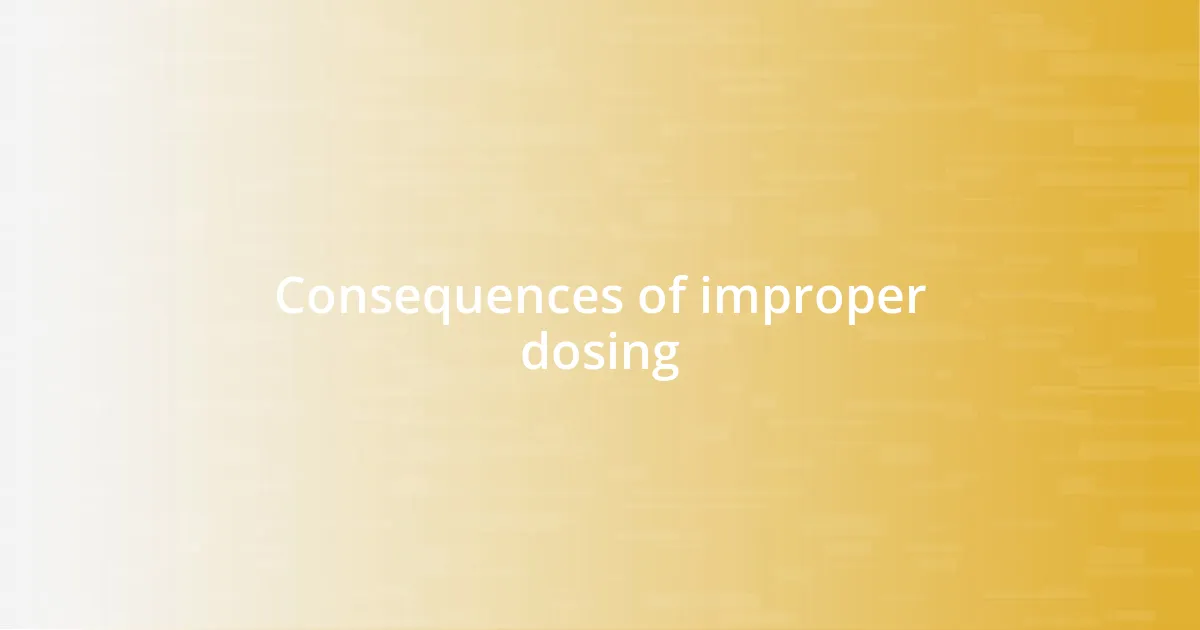Key takeaways:
- Dosing variability is influenced by factors such as genetics, age, weight, lifestyle choices, and psychological state, highlighting the need for personalized medicine.
- Improper dosing can lead to serious consequences, including overmedication or undermedication, affecting patients’ daily lives and emotional well-being.
- Strategies like regular follow-ups, leveraging technology, and involving patients in their treatment decisions can optimize medication effectiveness.
- The future of dosing practices is shifting towards personalized approaches through genetic testing, AI integration, and collaborative care models among healthcare professionals.

Understanding variability in dosing
Variability in dosing is a fascinating yet complex aspect of medicine. I remember grappling with this concept during my early days working in pharmacology, trying to understand why two patients with the same diagnosis might require significantly different dosages. Have you ever thought about how factors like genetics, age, and even lifestyle can lead to such variations? It really opened my eyes to the importance of personalized medicine.
Consider how weight and metabolism also play critical roles in how our bodies absorb and utilize medications. I once had a friend who was prescribed a standard dosage for a particular medication. It didn’t work for him, and it took several trial-and-error adjustments to find the right amount. This experience made me wonder: how many patients are out there on the “one-size-fits-all” dosage model that doesn’t serve their unique needs?
Another important factor is adherence to medication schedules. I’ve seen cases where patients misunderstood their dosages or the timing of their medications, leading to ineffective treatment. It’s a stark reminder that understanding variability in dosing isn’t just about science; it’s about communication and education. Isn’t it crucial that we ensure patients fully grasp their treatment plans?

Factors affecting dosing variability
Dosing variability can be influenced by a multitude of factors, with genetics often taking the lead. I recall a case where a patient’s family history illuminated why she reacted differently to her prescribed antidepressant. Genetic variations can result in different metabolic rates, which means that some might break down a drug too quickly, while others may do so too slowly. This insight reinforced my belief in the necessity for genetic testing in certain treatments—choice matters.
Another significant factor to consider is age. I remember my grandmother, who was prescribed the same medication as my younger uncle for heart issues. The dose was drastically different between them due to her slower metabolism and increased sensitivity to medications. Age-related changes in body composition can alter how drugs are distributed and how effectively they work. This experience has shaped my perspective on the importance of tailored treatments throughout different life stages.
Additionally, lifestyle choices play an undeniable role in dosing variability. Think about it—diet, exercise, and even stress levels can affect how medications are absorbed and utilized in our bodies. Once, while discussing medication with a colleague, we discovered that a patient’s high-fat diet had interfered with the absorption of their cholesterol-lowering medication. It was eye-opening to realize that lifestyle factors are pivotal yet often overlooked in medication management. Here’s a summary of these factors and their impacts in tabular form:
| Factor | Impact on Dosing Variability |
|---|---|
| Genetics | Influences drug metabolism and effectiveness |
| Age | Affects drug distribution and sensitivity |
| Lifestyle Choices | Can alter absorption and effectiveness of medications |

The role of patient characteristics
Patient characteristics play a crucial role in determining the effectiveness and safety of medication dosing. For instance, I once worked with a young patient whose anxiety medication required careful titration because of her unique reaction to the drug. While her peers were finding relief with standard dosages, she experienced side effects that prompted us to adjust her dosage more frequently. This emphasized to me how essential it is to consider each individual’s reaction to medications.
Here are some key patient characteristics that influence dosing variability:
– Genetic Makeup: Variations can drastically affect how a drug is processed in the body.
– Weight: Heavier individuals may require higher doses, while those who are underweight might need less.
– Pre-existing Conditions: Comorbidities can complicate how medications are metabolized and utilized.
The emotional and psychological state of a patient is another significant aspect that can’t be overlooked. I vividly recall a patient who, despite receiving the same medication as others in his treatment group, found it difficult to improve due to his ongoing stress and mental health challenges. It made me ponder how mental well-being can shape one’s response to medication, showing that it’s not just the biology at play but also the emotional landscape.
It’s important to remember these factors when prescribing medications:
– Psychological Factors: Anxiety or depression can influence medication adherence and response.
– Social Support Systems: Individuals with strong support may adhere better to treatment plans compared to those who are isolated.
– Cultural Background: Beliefs about health and treatment can affect how a patient perceives and responds to medications.

Consequences of improper dosing
Consequences of improper dosing can be dire and multifaceted. I once encountered a patient who was unintentionally overmedicated due to an unclear medication schedule, leading to severe drowsiness that impacted her daily activities. It made me think—how often do we overlook the importance of precise dosing and fail to realize its broad implications on people’s lives?
Underdosing, on the other hand, can be just as harmful. I remember a case where a young man had been prescribed a medication for his hyperactivity, but his parents, worried about side effects, consistently administered a lower dose. It was only after a couple of months that we realized the medication wasn’t having any effect, causing frustration for both the family and the healthcare team. It raises a critical question—what do we sacrifice when we don’t fully adhere to the prescribed regimen?
Ultimately, the emotional toll of improper dosing can be profound. Consider someone who has high hopes for relief from chronic pain but is let down repeatedly due to fluctuating dosages. I felt their desperation during consultations, as they struggled to explain how their treatment felt like a rollercoaster. This reinforces the notion that managing medication should not just be a clinical duty, but a deeply personal commitment to understanding—because every decision has a ripple effect on a patient’s quality of life.

Strategies to optimize dosing
I’ve discovered several strategies to optimize dosing that go beyond just the numbers on a prescription pad. One approach I’ve found effective is implementing regular follow-ups to monitor patient responses. I once had a patient on blood pressure medication whose readings were all over the place. By adjusting her dosing schedule based on weekly check-ins, we fine-tuned her treatment, leading to significant improvements. Have you ever considered how a simple conversation could alter a medication’s effectiveness?
Another essential strategy is leveraging technology. Utilizing mobile apps or digital health records can track medication adherence and effectiveness in real-time. I remember a colleague who introduced a dosing app to a group of patients. The immediate feedback prompted them to report side effects and discrepancies promptly, leading to timely adjustments in their treatment plans. Isn’t it fascinating how embracing technology can trigger meaningful changes in patient care?
Finally, I can’t stress enough the importance of involving patients in their own dosing decisions. During one of my consultations, I encouraged a patient to voice his concerns about his medication’s side effects. Together, we explored alternative options and settled on a different approach that he felt more comfortable with. It made me realize that when patients take an active role, it not only enhances their confidence but also fosters a collaborative relationship that can lead to better outcomes. Have you thought about how empowering patients can change their relationship with medication?

Evaluating dosing effectiveness
Evaluating dosing effectiveness requires a careful consideration of several factors, including patient feedback and clinical outcomes. I vividly remember a patient who shared that the morning dose of his medication left him feeling groggy during work hours. This insight prompted a discussion on shifting his dosing to later in the day, which ultimately improved his productivity. Have you ever noticed how small adjustments can create significant changes in one’s day-to-day life?
It’s also crucial to analyze the data surrounding dosing patterns. In one particular case, I reviewed a series of side effects reported by different patients on the same medication. I noticed a pattern that led me to question whether the standard dosing guidelines were truly effective for our diverse patient population. This experience made me wonder—how often are we using a one-size-fits-all approach when a tailored strategy could yield better results?
Lastly, I find that an open dialogue about dosing not only addresses clinical concerns but also fosters trust. A patient once expressed worry over their dosage, fearing it might lead to dependency. By discussing the reasoning behind each adjustment, I not only put their mind at ease but also empowered them to take ownership of their treatment. Isn’t it incredible how transparency can enhance a patient’s sense of control over their own health?

Future trends in dosing practices
As I look toward the future of dosing practices, I can’t help but be excited about the potential of personalized medicine. Recently, I came across a groundbreaking study that utilized genetic testing to determine optimal drug dosages for individuals. This approach really struck me because it moves away from the traditional “one-size-fits-all” method. Isn’t it remarkable to think that our genetic makeup could influence how we respond to medications? I’m eager to see how this trend evolves in practice.
Another trend I anticipate is the integration of artificial intelligence in tailoring dosing strategies. In a recent workshop, I witnessed how AI algorithms can analyze vast amounts of patient data to predict the most effective dosing regimens. The possibilities of having real-time adjustments based on continuous health monitoring are astounding. Can you imagine how streamlined and accurate our dosing decisions could become with this type of technology aiding our judgment?
Moreover, I believe we’ll see an increase in collaborative care models, where pharmacists and healthcare providers work closely to optimize dosing. Once, I collaborated with a pharmacist who identified a more effective dosing strategy for a patient on multiple medications. Our combined efforts not only improved the patient’s adherence but also resulted in a significant reduction in side effects. How powerful is it when different healthcare professionals share insights for the common goal of patient wellbeing? The future of dosing practices is looking not just promising, but also profoundly collaborative.















